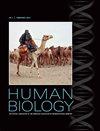Population Identifiability from Forensic Genetic Markers: Ancestry Variation in Latin America
4区 生物学
Q2 Medicine
引用次数: 0
Abstract
The Combined DNA Index System (CODIS) loci comprise a standard microsatellite marker set widely used for distinguishing among individuals in forensic DNA identity testing for medicolegal casework in the United States and in other countries. In anthropological genetic research, CODIS markers have become an important tool for uses extending beyond case investigations to quantify ancestry proportions, reveals patterns of admixture, and trace population histories. These investigations are especially prevalent in studies of Latin American population structure. Nevertheless, the accuracy of the ancestry estimates computed from the CODIS loci for highly admixed Latino populations has not been formally tested. Longstanding arguments have been made that small ancestry panels, including the CODIS loci specifically, are not suitable for ancestry inference in admixed populations, due to high heterozygosity and limited number of loci used. Recent studies on ancestry inference using the CODIS loci suggest that these do confer more information of population-level identifiability than recognized in forensic genetic scholarship and by the medicolegal community. Here, we formally test the ability of CODIS and CODIS-proxy (e.g., high-heterozygosity and individual-identifiability loci) marker panels to accurately estimate admixture proportions of individuals, including a sample of Latinos with a wide range of ancestry proportions. Using the same individuals to make direct comparisons of the outcomes, the authors produced ancestry estimates from (a) a small CODIS/CODIS-proxy locus panel and (b) a robust and validated microsatellite ancestry-informative panel. They found evidence (e.g., ρ = 0.80–0.88) that supports the use of CODIS/ CODIS-proxy loci to capture the general ancestry estimation trends of a sample. This finding is in line with results of studies using CODIS on Latin American populations: the ancestry estimations generated by CODIS present trends supported by documented population histories (e.g., colonialism and population movements) and microevolutionary events (e.g., gene flow) in Latin America. However, this study also highlights the limitations of CODIS for making individual-level inferences of ancestry: the associated estimates for an acceptable level of statistical confidence (95%) are too broad to make any nuanced inferences regarding an individual’s actual ancestry composition.来自法医遗传标记的群体可识别性:拉丁美洲的祖先变异
综合DNA索引系统(CODIS)基因座包括一个标准的微卫星标记集,在美国和其他国家的法医学案件的法医DNA鉴定测试中广泛用于区分个体。在人类学遗传学研究中,CODIS标记已成为一种重要的工具,其用途已超越个案调查,可用于量化祖先比例、揭示混合模式和追踪人口历史。这些调查在拉丁美洲人口结构的研究中尤其普遍。然而,从CODIS基因座计算的高度混合拉丁裔人群祖先估计的准确性尚未得到正式测试。长期以来,人们一直认为,由于高杂合性和使用的位点数量有限,小型祖先面板,特别是CODIS位点,不适合在混合人群中进行祖先推断。最近关于使用CODIS基因座进行祖先推断的研究表明,这些基因座确实提供了比法医遗传学术和医药界所认识到的更多的种群水平可识别性信息。在这里,我们正式测试了CODIS和CODIS代理(例如,高杂合性和个体可识别位点)标记面板准确估计个体混合比例的能力,包括具有广泛祖先比例的拉丁美洲人样本。使用相同的个体对结果进行直接比较,作者从(a)一个小型CODIS/CODIS代理位点小组和(b)一个强大且有效的微卫星祖先信息小组中得出了祖先估计。他们发现证据(例如,ρ = 0.80-0.88)支持使用CODIS/ CODIS代理基因座来捕获样本的一般祖先估计趋势。这一发现与使用CODIS对拉丁美洲人口进行的研究结果一致:CODIS产生的祖先估计呈现出拉丁美洲有文献记载的人口历史(例如,殖民主义和人口流动)和微观进化事件(例如,基因流动)支持的趋势。然而,这项研究也强调了CODIS在个人层面上推断祖先的局限性:可接受的统计置信水平(95%)的相关估计过于宽泛,无法对个人的实际祖先组成做出任何细微的推断。
本文章由计算机程序翻译,如有差异,请以英文原文为准。
求助全文
约1分钟内获得全文
求助全文
来源期刊

Human Biology
生物-生物学
CiteScore
1.90
自引率
0.00%
发文量
88
审稿时长
>12 weeks
期刊介绍:
Human Biology publishes original scientific articles, brief communications, letters to the editor, and review articles on the general topic of biological anthropology. Our main focus is understanding human biological variation and human evolution through a broad range of approaches.
We encourage investigators to submit any study on human biological diversity presented from an evolutionary or adaptive perspective. Priority will be given to interdisciplinary studies that seek to better explain the interaction between cultural processes and biological processes in our evolution. Methodological papers are also encouraged. Any computational approach intended to summarize cultural variation is encouraged. Studies that are essentially descriptive or concern only a limited geographic area are acceptable only when they have a wider relevance to understanding human biological variation.
Manuscripts may cover any of the following disciplines, once the anthropological focus is apparent: human population genetics, evolutionary and genetic demography, quantitative genetics, evolutionary biology, ancient DNA studies, biological diversity interpreted in terms of adaptation (biometry, physical anthropology), and interdisciplinary research linking biological and cultural diversity (inferred from linguistic variability, ethnological diversity, archaeological evidence, etc.).
 求助内容:
求助内容: 应助结果提醒方式:
应助结果提醒方式:


